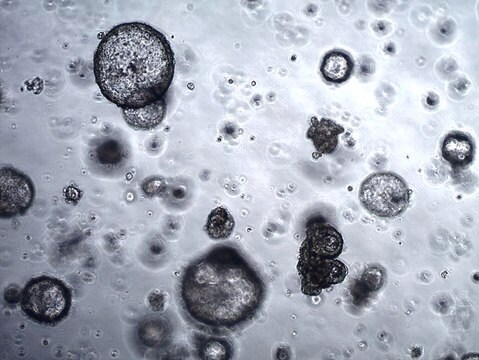SCC702
3dGRO® Pancreatic Organoids (PPTO.13)
Human
Sinónimos:
3dGRO® Pancreatic Organoids (PPTO.13), PDAC Organoid, Pancreatic Cancer Organoid, Pancreatic Ductal Organoid, Pancreatic Tumor Organoid
About This Item
Productos recomendados
product name
3dGRO® Pancreatic Organoids (PPTO.13),
biological source
human
Quality Level
packaging
vial of ≥1500 organoids vial
manufacturer/tradename
Millipore
technique(s)
cell culture | stem cell: suitable
shipped in
liquid nitrogen
storage temp.
−196°C
Application
- Viability: >1500 viable organoids/vial
- Organoid Growth: Pass
- Cells are tested negative for infectious diseases by a Human Essential CLEAR panel by Charles River Animal Diagnostic Services.
- Mycoplasma Contamination: Negative
- STR Profile: Pass
Features and Benefits
Target description
Recent breakthroughs in three-dimensional (3D) culture methods have led to the development of organoid culture platforms, which allow researchers to perform translational research on long-term in vitro cultures not limited by barriers present in 2D culture or animal models. We now offer a comprehensive collection of patient derived pancreatic ductal adenocarcinoma cancer (PDAC) organoids for cancer research and drug discovery applications.
Cell Line Characteristics
• Sex: Male
• Age: 73 Years
• Organ: Pancreas (Primary Tumor)
• Disease: Ductal Adenocarcinoma (KRAS mutation: G12R)
Storage and Stability
Other Notes
Legal Information
Disclaimer
Storage Class
12 - Non Combustible Liquids
wgk_germany
WGK 2
flash_point_f
Not applicable
flash_point_c
Not applicable
Certificados de análisis (COA)
Busque Certificados de análisis (COA) introduciendo el número de lote del producto. Los números de lote se encuentran en la etiqueta del producto después de las palabras «Lot» o «Batch»
¿Ya tiene este producto?
Encuentre la documentación para los productos que ha comprado recientemente en la Biblioteca de documentos.
Nuestro equipo de científicos tiene experiencia en todas las áreas de investigación: Ciencias de la vida, Ciencia de los materiales, Síntesis química, Cromatografía, Analítica y muchas otras.
Póngase en contacto con el Servicio técnico